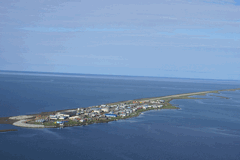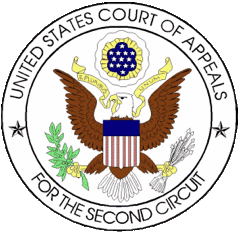A New Way to Tackle Carbon Emissions
Air Date: Week of October 2, 2009

The 400 people living in Kivalina, Alaska are in danger of losing their home to the rising sea. The Second Circuit Court decision equips them to sue green house gas emitting power companies for damages. (Coast Guard photo/ Lt. Cdr. Micheal McNeil)
In a landmark case, the Second Circuit Court of Appeals has ruled that carbon dioxide emissions do qualify as a “public nuisance.” The decision means that states and land trusts can sue power companies to make them curb their greenhouse gas emissions. Host Steve Curwood asks Pat Parenteau, a professor at Vermont Law School, whether the court’s lead on climate will spur other branches of government into action.
Transcript
YOUNG: It’s Living on Earth. I’m Jeff Young.
CURWOOD: And I’m Steve Curwood. The Second US Circuit Court of Appeals has opened the door for states and even private citizens to sue coal-fired power plants and other major emitters of global warming gases. The decision, which is predicated on the grounds that greenhouse gases may be a public nuisance, came in a case called the State of Connecticut versus American Electric Power. Patrick Parenteau is a professor at Vermont Law School. Professor Parenteau told us the ruling could prove to have a major impact.
PARENTEAU: The remarkable thing is that the second circuit said this is just another tort-type case. It’s a big one, of course, and it’s loaded with complicated science questions, and cause-and-effect questions, but at bottom it is a tort case.
CURWOOD: And, quickly, for those of use who didn’t get to go to law school, what’s the shorthand definition of tort?
PARENTEAU: Tort is civil wrong, it’s the kind of thing where someone runs a stop sign and runs into your car. It’s an everyday occurrence in courts all across the country. Medical malpractice, of course very controversial these days in light of health care, is a large area of tort law.
CURWOOD: So, in the wake of this decision, who now then has the right to bring a lawsuit against a company emitting greenhouse gasses?
PARENTEAU: Yes, the court ruled that not only do states have the right to bring these actions, but most interesting, private parties, and specifically land trusts that own, for example, property in the coastal zone threatened by sea-level rise – they, too, have standing to bring public nuisance actions, and that’s quite remarkable.

The Second Circuit Court of Appeals is the third highest court in the land.
CURWOOD: Now, what impact will this decision have on let’s say the case of the Alaskan village of Kivalina, who filed suit last year against the power companies for greenhouse gas emissions. What will they be able to do in light of this ruling?
PARENTEAU: That’s going to have a significant effect. The second circuit is a very well regarded court of appeal, it’s probably – if you were thinking of ranking – it’s probably ranks third of all the courts in the land, with the Supreme Court being first and the D.C. circuit being second. So, it’s going to have an impact on the Kivalina case, which is pending in the district court in northern California to determine whether or not the damage being done to the village of Kivalina, which, of course, is literally – the island it’s on is disintegrating into the Arctic Sea and is going to have to be relocated. And, so this decision opens the door, I think, for the Kivalina case to proceed to trail.
CURWOOD: So, at the end of the day, what are the political effects of this ruling? I mean, right now we have Congress moving toward a climate legislation, there was an earlier Supreme Court decision that allowed the EPA to consider carbon dioxide – the global-warming gas – as a pollutant, and can therefore move toward cars and trucks that emit CO2; what are the political effects of this ruling?
PARENTEAU: I think the political effects may be some of the most important ones. The court was very careful to say, unless and until either the Environmental Protection Agency adopts specific regulations to control greenhouse gasses, or Congress acts to enact a comprehensive climate change bill, the courts are open to hear these cases and perhaps, at some point, hand down a verdict against some of these industrial sources. So, it’s interesting, it’s another indication of the judicial branch putting pressure, in effect, on the other branches of government.

The 400 people living in Kivalina, Alaska are in danger of losing their home to the rising sea. The Second Circuit Court decision equips them to sue green house gas emitting power companies for damages. (Coast Guard photo/ Lt. Cdr. Micheal McNeil)
CURWOOD: You say that this is a catalyst for the other branches of government; what would happen if the courts continued to be involved in these global warming gas cases, and say, Congress and the Executive didn’t do anything?
PARENTEAU: Well, in the Connecticut case, the second circuit case, the states are seeking a remedy that would, in effect, be a cap on the emissions of the specific power plants that they’ve sued, the largest one being the American Electric Power Company, which is the largest utility in the country with the most number of coal-fired power plants.
So, what this decision is saying is if the states are able to establish liability after a trial, in other words, if they are able to connect the emissions from these sources to impacts in Connecticut and other states, then the courts are going to order the utilities to start limiting the amount of emissions. And that kind of remedy scares the industry greatly. In fact, one of the other effects of this decision is gonna be impacts on their stockholders and their financial institutions that support them because this now opens the doors to liability and they’ll have to report that risk of liability to the Securities and Exchange Commission and other institutions.
So, it has a lot of different ripple effects, and as the industries react to the potential for liability, I would anticipate the pressure on Congress to act and protect the industries from this kind of liability will also increase.
CURWOOD: Some people are comparing these greenhouse gas court cases to the tobacco litigation. How fair a comparison is that?
PARENTEAU: Well, in the Kivalina case, one of the claims made is that the defendant companies, and that includes utilities and coal companies, conspired to mislead the public in the…and the legislative branch, on the dangers of climate change, which means that they could put the oil and coal companies under oath the same way the tobacco companies were put under oath in the tobacco cases.
And they’d have to answer questions about, did you in fact fund studies that claimed that climate change was not real, and did you put out public announcements, and in effect, propaganda that was you knew to be false, or at least misleading? And when the plaintiffs in these cases are able to prove a conspiracy, the courts are much more likely to assign liability to those corporations as a consequence of those overt acts of misleading the public.
CURWOOD: Would they have to put warning labels on the products that they sell?
PARENTEAU: [laughs] Well, we aren’t at that point yet…
CURWOOD: Patrick Parenteau directs the Environment and Natural Resources Law Clinic at the Vermont Law School. Thank you so much, Professor Parenteau.
PARENTEAU: My pleasure, Steve.
Links
The 2nd circuit court's decision may spur action from the other branches of government.
Living on Earth wants to hear from you!
Living on Earth
62 Calef Highway, Suite 212
Lee, NH 03861
Telephone: 617-287-4121
E-mail: comments@loe.org
Newsletter [Click here]
Donate to Living on Earth!
Living on Earth is an independent media program and relies entirely on contributions from listeners and institutions supporting public service. Please donate now to preserve an independent environmental voice.
NewsletterLiving on Earth offers a weekly delivery of the show's rundown to your mailbox. Sign up for our newsletter today!
 Sailors For The Sea: Be the change you want to sea.
Sailors For The Sea: Be the change you want to sea.
 Creating positive outcomes for future generations.
Creating positive outcomes for future generations.
 Innovating to make the world a better, more sustainable place to live. Listen to the race to 9 billion
Innovating to make the world a better, more sustainable place to live. Listen to the race to 9 billion
 The Grantham Foundation for the Protection of the Environment: Committed to protecting and improving the health of the global environment.
The Grantham Foundation for the Protection of the Environment: Committed to protecting and improving the health of the global environment.
 Contribute to Living on Earth and receive, as our gift to you, an archival print of one of Mark Seth Lender's extraordinary wildlife photographs. Follow the link to see Mark's current collection of photographs.
Contribute to Living on Earth and receive, as our gift to you, an archival print of one of Mark Seth Lender's extraordinary wildlife photographs. Follow the link to see Mark's current collection of photographs.
 Buy a signed copy of Mark Seth Lender's book Smeagull the Seagull & support Living on Earth
Buy a signed copy of Mark Seth Lender's book Smeagull the Seagull & support Living on Earth

